For more than 70 years, this United Nations' agency has been based in Bangkok. Its Executive Secretary explains why its multi-faceted role is so important to the region
ESCAP came into being in 1947 as the Economic Commission for Asia and the Far East (ECAFE) to assist in post-war economic reconstruction. After a two-year period in Shanghai it moved to Bangkok in January 1949, its permanent home ever since, serving as the United Nations’ regional hub promoting cooperation among countries here.
The BigChilli recently caught up with Armida Salsiah Alisjahbana, ESCAP’s Executive Secretary who took up her post in Bangkok on November 1, 2018. Appointed by the United Nations Secretary-General António Guterres, she is also the UN Under-Secretary-General. Ms Alisjahbana celebrates her 60th birthday on August 16.
By MAXMILIAN WECHSLER
The BigChilli recently caught up with Armida Salsiah Alisjahbana, ESCAP’s Executive Secretary who took up her post in Bangkok on November 1, 2018. Appointed by the United Nations Secretary-General António Guterres, she is also the UN Under-Secretary-General. Ms Alisjahbana celebrates her 60th birthday on August 16.
By MAXMILIAN WECHSLER
|
“My immediate superior, who has been a pleasure to serve under, is the current United Nations Secretary-General António Guterres. His support for ESCAP and the Regional Commissions has been instrumental in positive UN Development System changes,” commented Ms Alisjahbana to open this interview. “As we continue to reform, I look forward to his stewardship to better achieve our objectives.
“My Senior Management Team comprises two Deputy Executive Secretaries, eleven Directors in Bangkok and five in the subregions, who supervise the work of ESCAP’s substantive divisions and subregional offices, as well as operational and administrative matters. The Senior Management Team also plays a key role in strategically advancing the work of ESCAP.” Background “I am a native of Bandung, Indonesia and have fond memories of my hometown in West Java province. Indonesia is where my academic and professional career began. After completing my undergraduate degree at the Economics and Development Studies from Universitas Indonesia and obtaining my master’s degree in the United States, I began as a lecturer at Universitas Padjadjaran. The classroom holds a special place in my life; academia is my second home. In 2005, I continued my career as an educator at Universitas Padjadjaran as Professor of Economics,” Ms Alisjahbana said. |
“I transitioned to a different role in the public sphere from 2009 to 2014, when I served my country Minister of National Development Planning and the Head of the National Development Planning Agency (BAPPENAS), Indonesia. During this period, I was Alternate Governor of the World Bank and Alternate Governor of the Asian Development Bank representing the government of Indonesia. I have also served as Co-chair of the Global Partnership for Effective Development Cooperation from 2012 to 2014.
“The United Nations and the broader development community has always been in my orbit. My background in the academic field related to development economics also helps because I did a lot of research work, basically on human resources, labour and sustainable development. In 2016, I was a member of the High-Level Independent Team of Advisors to support the ECOSOC Dialogue on the longer-term positioning of the United Nations Development System in the context of the 2030 Agenda on Sustainable Development.
“Throughout my career, I’ve been involved in various research projects and consultancies to the United Nations University/Institute for Advanced Study in Tokyo, the World Bank, the Asian Development Bank (ADB), the Department of Foreign Affairs and Trade (DFAT), Australia, the Australian Agency for International Development (AusAID), the European Commission, and the International Labor Organization (ILO).
“In mid-2018, the UN Executive Office of the Secretary-General invited me to take part in the selection process to lead one of the UN’s regional commissions - ESCAP. I had some interactions with ESCAP before, so, I participated. The selection process was led by a team of senior UN officials, led by the UN Deputy Secretary General, Ms Amina Mohammed. The process went on, and around September 2018, I was selected. On November 1, 2018, I assumed the helm of ESCAP.
“I have two goals in my tenure. The first one is climate change. It is a big problem because 50% of newly created greenhouse gases come from the Asia Pacific. If we create the problem then we have to contribute to the solution. The second one is technology. Many countries in the Asia Pacific have transformed into middle income countries and even emerging countries.
“Many countries in the region are already leaders in technology. So, technology is a potential solution to climate change and also other development problems such as poverty and economic inequality. Those two had not been the focus of ESCAP so far.
“As a regional commission, ESCAP has intergovernmental convening power that could be used effectively and this is now especially crucial in bring countries together to discuss policy responses to handle the socio-economic impacts of the pandemic and ways the region can build back better post COVID-19.”
“The United Nations and the broader development community has always been in my orbit. My background in the academic field related to development economics also helps because I did a lot of research work, basically on human resources, labour and sustainable development. In 2016, I was a member of the High-Level Independent Team of Advisors to support the ECOSOC Dialogue on the longer-term positioning of the United Nations Development System in the context of the 2030 Agenda on Sustainable Development.
“Throughout my career, I’ve been involved in various research projects and consultancies to the United Nations University/Institute for Advanced Study in Tokyo, the World Bank, the Asian Development Bank (ADB), the Department of Foreign Affairs and Trade (DFAT), Australia, the Australian Agency for International Development (AusAID), the European Commission, and the International Labor Organization (ILO).
“In mid-2018, the UN Executive Office of the Secretary-General invited me to take part in the selection process to lead one of the UN’s regional commissions - ESCAP. I had some interactions with ESCAP before, so, I participated. The selection process was led by a team of senior UN officials, led by the UN Deputy Secretary General, Ms Amina Mohammed. The process went on, and around September 2018, I was selected. On November 1, 2018, I assumed the helm of ESCAP.
“I have two goals in my tenure. The first one is climate change. It is a big problem because 50% of newly created greenhouse gases come from the Asia Pacific. If we create the problem then we have to contribute to the solution. The second one is technology. Many countries in the Asia Pacific have transformed into middle income countries and even emerging countries.
“Many countries in the region are already leaders in technology. So, technology is a potential solution to climate change and also other development problems such as poverty and economic inequality. Those two had not been the focus of ESCAP so far.
“As a regional commission, ESCAP has intergovernmental convening power that could be used effectively and this is now especially crucial in bring countries together to discuss policy responses to handle the socio-economic impacts of the pandemic and ways the region can build back better post COVID-19.”
About ESCAP
ESCAP’s journey began in 1947 as the Economic Commission for Asia and the Far East (ECAFE) to assist in post-war economic reconstruction. Initially, ECOSOC declared Shanghai to be the temporary home for ECAFE. In January 1949, it moved to Bangkok, which has been our permanent home ever since.
ESCAP serves as the United Nations’ regional hub promoting cooperation among countries to achieve inclusive and sustainable development, with priority accorded to the implementation of the 2030 Agenda and the achievement of the Sustainable Development Goals (SDGs).
As the largest regional intergovernmental platform with 53 Member States and nine associate members, ESCAP has emerged as a strong regional think-tank offering countries sound analytical products that shed insight into the evolving economic, social and environmental dynamics of the region.
“Each year, representatives for Member States meet for the Commission session to deliberate important issues pertaining to inclusive and sustainable economic and social development in the region, decide on the recommendations of its subsidiary bodies and of the Executive Secretary, review and endorse the proposed strategic framework and programme of work, and to make any other decisions required.
“Today, strategic alliances and regional expertise have lifted millions out of poverty in Asia-Pacific and guided the region on enabling a better standard of life for all as envisaged in the Charter of the United Nations.
“We are at a critical moment as a regional organization to step up support to countries during the COVID-19 pandemic and to ultimately meet the ambitious targets set out by the 2030 Agenda for Sustainable Development. Our absolute priority at ESCAP is to support our members achieve the Sustainable Development Goals by 2030.
“The Commission’s strategic focus to deliver on the 2030 Agenda is reinforced and deepened by promoting regional cooperation and integration to advance responses to shared vulnerabilities, connectivity, financial cooperation and market integration. ESCAP’s research and analysis coupled with its policy advisory services, capacity building and technical assistance to governments aims to support countries’ sustainable and inclusive development ambitions.
ESCAP’s journey began in 1947 as the Economic Commission for Asia and the Far East (ECAFE) to assist in post-war economic reconstruction. Initially, ECOSOC declared Shanghai to be the temporary home for ECAFE. In January 1949, it moved to Bangkok, which has been our permanent home ever since.
ESCAP serves as the United Nations’ regional hub promoting cooperation among countries to achieve inclusive and sustainable development, with priority accorded to the implementation of the 2030 Agenda and the achievement of the Sustainable Development Goals (SDGs).
As the largest regional intergovernmental platform with 53 Member States and nine associate members, ESCAP has emerged as a strong regional think-tank offering countries sound analytical products that shed insight into the evolving economic, social and environmental dynamics of the region.
“Each year, representatives for Member States meet for the Commission session to deliberate important issues pertaining to inclusive and sustainable economic and social development in the region, decide on the recommendations of its subsidiary bodies and of the Executive Secretary, review and endorse the proposed strategic framework and programme of work, and to make any other decisions required.
“Today, strategic alliances and regional expertise have lifted millions out of poverty in Asia-Pacific and guided the region on enabling a better standard of life for all as envisaged in the Charter of the United Nations.
“We are at a critical moment as a regional organization to step up support to countries during the COVID-19 pandemic and to ultimately meet the ambitious targets set out by the 2030 Agenda for Sustainable Development. Our absolute priority at ESCAP is to support our members achieve the Sustainable Development Goals by 2030.
“The Commission’s strategic focus to deliver on the 2030 Agenda is reinforced and deepened by promoting regional cooperation and integration to advance responses to shared vulnerabilities, connectivity, financial cooperation and market integration. ESCAP’s research and analysis coupled with its policy advisory services, capacity building and technical assistance to governments aims to support countries’ sustainable and inclusive development ambitions.
We already know our region's effort must be intensified – on its current trajectory, Asia and the Pacific will not achieve any of the 17 Goals.
“The socio-economic impacts of COVID-19 is also threatening to reverse years of hard-won development gains in many countries. We owe it to future generations to seize this opportunity, to come together and to quicken our pace to achieve sustainable development in Asia and the Pacific.
“ESCAP emphasizes strengthening institutional capacities by working in close cooperation with other United Nations entities and intergovernmental organizations in the region, in the following areas: ICT and Disaster Risk Reduction; Environment and Development; Social Development; Statistics; Macroeconomic Policy and Financing for Development; Trade, Investment and Innovation; Transport; and Energy.
“Institutional change at all levels is required to ensure more efficient and effective delivery of essential services to the region’s growing population. Hence, ESCAP’s products and services support its member States in building national capacities in: Strengthening and implementing equitable and sustainable economic and social development policies and programmes; promoting multilateral and regional trade, transport, information and communication technology, energy and environmental partnerships; building effective partnerships with civil society and the private sector; and reviewing progress in achieving the internationally agreed development goals and targets adopted at global and regional conferences.
“We have five Subregional Offices and five Regional Institutions:
• Subregional Office for the Pacific, located in Suva, Fiji: The Subregional Office for the Pacific provides a link between the work of ESCAP and the needs of the Pacific island developing States members in their efforts to achieve sustainable development. Established in 1984 the office promotes regional cooperation and knowledge sharing, provides technical assistance and advisory services on economic and social policies and conduct researches on issues relevant to Pacific island developing States members.
• Subregional Office for East and North-East Asia, located in Incheon, Republic of Korea: The Subregional Office for East and North-East Asia (ESCAP-ENEA) works to build and strengthen multilateral partnerships and intergovernmental cooperation for inclusive and sustainable development and integration in East and North-East Asia. It also serves as the Secretariat of the North-East Asian Subregional Programme for Environmental Cooperation (NEASPEC).
• Subregional Office for South and South-West Asia, located in New Delhi, India: The Subregional Office for South and South-West Asia (ESCAP-SSWA) promotes regional cooperation for inclusive and sustainable economic and social development in South and South-West Asia. The SSWA Office bridges the developing and developed countries in the subregion and works with ten member States in the subregion.
• Subregional Office for North and Central Asia, located in Almaty, Kazakhstan: The Subregional Office for North and Central Asia (ESCAP-NCA) is the subregional coordinating body for sustainable development among the member States in North and Central Asia, many of which are landlocked developing countries. Given the lack of territorial access to the sea, the region is advancing connectivity, namely in transport and trade agreements to reduce transit costs and reach markets for exports.
• Subregional activities for South-East Asia, based in Bangkok, Thailand, were consolidated to promote development in the South-East Asian subregion and strengthen cooperation with ASEAN.
• The five Regional Institutions: The Asian and Pacific Training Centre for Information and Communication Technology for Development (APCICT) was inaugurated on 16 June 2006 and is located in Incheon, Republic of Korea. Guided by the 2030 Agenda and other internationally agreed development goals, the Centre’s objective is to build and strengthen the capacity of members and associate members of ESCAP to leverage information and communication (ICT) for the purpose of socio-economic development. APCICT’s work is focused on training, knowledge sharing, and multi-stakeholder dialogue and partnership.
• The Asian and Pacific Centre for Transfer of Technology (APCTT) was established in 1977 and is based in New Delhi. APCTT promotes transfer of technology to and from small- and medium-scale enterprises (SMEs) in Asia and the Pacific. The Centre also implements development projects funded by international donors aimed at strengthening the environment for technology transfer among SMEs in Asia and the Pacific; in this respect the Centre makes special efforts to encourage more participation of women in the field of technology.
• The Asian and Pacific Centre for the Development of Disaster Information Management (APDIM) began operations in Tehran in 2018. APDIM’s key aim is to build disaster resilience in the Asia-Pacific region through information management. The Centre strengthens regional cooperation in Disaster Risk Reduction (DRR) and promotes effective policies for inclusive, sustainable and resilient development in the region.
• The Statistical Institute for Asia and the Pacific (SIAP), based in Chiba, Japan, was established in May 1970 as a centre for statistical training in Asia and the Pacific. It seeks to improve the use of statistics for evidence-based decision-making and to produce and disseminate quality statistics for inclusive, sustainable and resilient societies in the ESCAP region.
• The Centre for Sustainable Agricultural Mechanization (CSAM) in Beijing, China, was established to achieve production gains, improved rural livelihood and poverty alleviation through sustainable agricultural mechanization for a more resilient, inclusive and sustainable Asia and the Pacific. CSAM’s objectives are to enhance technical cooperation among ESCAP and other UN member States through extensive exchange of information and sharing of knowledge, and promotion of research and development and agro-business development in the area of sustainable agricultural mechanization and technology.”
“The socio-economic impacts of COVID-19 is also threatening to reverse years of hard-won development gains in many countries. We owe it to future generations to seize this opportunity, to come together and to quicken our pace to achieve sustainable development in Asia and the Pacific.
“ESCAP emphasizes strengthening institutional capacities by working in close cooperation with other United Nations entities and intergovernmental organizations in the region, in the following areas: ICT and Disaster Risk Reduction; Environment and Development; Social Development; Statistics; Macroeconomic Policy and Financing for Development; Trade, Investment and Innovation; Transport; and Energy.
“Institutional change at all levels is required to ensure more efficient and effective delivery of essential services to the region’s growing population. Hence, ESCAP’s products and services support its member States in building national capacities in: Strengthening and implementing equitable and sustainable economic and social development policies and programmes; promoting multilateral and regional trade, transport, information and communication technology, energy and environmental partnerships; building effective partnerships with civil society and the private sector; and reviewing progress in achieving the internationally agreed development goals and targets adopted at global and regional conferences.
“We have five Subregional Offices and five Regional Institutions:
• Subregional Office for the Pacific, located in Suva, Fiji: The Subregional Office for the Pacific provides a link between the work of ESCAP and the needs of the Pacific island developing States members in their efforts to achieve sustainable development. Established in 1984 the office promotes regional cooperation and knowledge sharing, provides technical assistance and advisory services on economic and social policies and conduct researches on issues relevant to Pacific island developing States members.
• Subregional Office for East and North-East Asia, located in Incheon, Republic of Korea: The Subregional Office for East and North-East Asia (ESCAP-ENEA) works to build and strengthen multilateral partnerships and intergovernmental cooperation for inclusive and sustainable development and integration in East and North-East Asia. It also serves as the Secretariat of the North-East Asian Subregional Programme for Environmental Cooperation (NEASPEC).
• Subregional Office for South and South-West Asia, located in New Delhi, India: The Subregional Office for South and South-West Asia (ESCAP-SSWA) promotes regional cooperation for inclusive and sustainable economic and social development in South and South-West Asia. The SSWA Office bridges the developing and developed countries in the subregion and works with ten member States in the subregion.
• Subregional Office for North and Central Asia, located in Almaty, Kazakhstan: The Subregional Office for North and Central Asia (ESCAP-NCA) is the subregional coordinating body for sustainable development among the member States in North and Central Asia, many of which are landlocked developing countries. Given the lack of territorial access to the sea, the region is advancing connectivity, namely in transport and trade agreements to reduce transit costs and reach markets for exports.
• Subregional activities for South-East Asia, based in Bangkok, Thailand, were consolidated to promote development in the South-East Asian subregion and strengthen cooperation with ASEAN.
• The five Regional Institutions: The Asian and Pacific Training Centre for Information and Communication Technology for Development (APCICT) was inaugurated on 16 June 2006 and is located in Incheon, Republic of Korea. Guided by the 2030 Agenda and other internationally agreed development goals, the Centre’s objective is to build and strengthen the capacity of members and associate members of ESCAP to leverage information and communication (ICT) for the purpose of socio-economic development. APCICT’s work is focused on training, knowledge sharing, and multi-stakeholder dialogue and partnership.
• The Asian and Pacific Centre for Transfer of Technology (APCTT) was established in 1977 and is based in New Delhi. APCTT promotes transfer of technology to and from small- and medium-scale enterprises (SMEs) in Asia and the Pacific. The Centre also implements development projects funded by international donors aimed at strengthening the environment for technology transfer among SMEs in Asia and the Pacific; in this respect the Centre makes special efforts to encourage more participation of women in the field of technology.
• The Asian and Pacific Centre for the Development of Disaster Information Management (APDIM) began operations in Tehran in 2018. APDIM’s key aim is to build disaster resilience in the Asia-Pacific region through information management. The Centre strengthens regional cooperation in Disaster Risk Reduction (DRR) and promotes effective policies for inclusive, sustainable and resilient development in the region.
• The Statistical Institute for Asia and the Pacific (SIAP), based in Chiba, Japan, was established in May 1970 as a centre for statistical training in Asia and the Pacific. It seeks to improve the use of statistics for evidence-based decision-making and to produce and disseminate quality statistics for inclusive, sustainable and resilient societies in the ESCAP region.
• The Centre for Sustainable Agricultural Mechanization (CSAM) in Beijing, China, was established to achieve production gains, improved rural livelihood and poverty alleviation through sustainable agricultural mechanization for a more resilient, inclusive and sustainable Asia and the Pacific. CSAM’s objectives are to enhance technical cooperation among ESCAP and other UN member States through extensive exchange of information and sharing of knowledge, and promotion of research and development and agro-business development in the area of sustainable agricultural mechanization and technology.”
ESCAP mission is a good fit for ASEAN and Thailand
“The Association of Southeast Asian Nations (ASEAN) is an important focus of my role at ESCAP. We at ESCAP are located in Thailand. I'm also from Indonesia, which is part of ASEAN, so ASEAN is a big thing for us. ESCAP is also cooperating with ASEAN on how to enhance complementarities between the ASEAN Community Vision 2025 and the 2030 Agenda. Our strong, regular cooperation with ASEAN represents joint efforts in attaining the SDGs and building a people-centred ASEAN Community to accelerate development gains, particularly in the era of COVID-19 pandemic,” Ms Alisjahbana said.
“Our response to the pandemic cannot be delinked from actions on the SDGs. The forthcoming ASEAN-UN Plan of Action 2021-2025 is an important opportunity to strengthen our comprehensive partnership and update emerging areas of cooperation such as gender mainstreaming, cyber-security and safe online environments and climate action.
“The Government of Thailand is both a strategic partner and gracious host to ESCAP. They have been invaluable partners in our safety and security during COVID-19. Before the pandemic, their generous hospitality allowed participants from across the region to convene in Bangkok to achieve our goals and share knowledge.
“ESCAP also relies on the Thai government for in-country expertise on strategic areas of work. For example, ESCAP and Google Thailand, in collaboration with the National Science, Technology and Innovation (STI) Policy Office of Thailand initiated a partnership to share best practices and identify solutions for promoting the use of AI for social good in Asia-Pacific. As part of the partnership, Google will be providing a grant to the Association of Pacific Rim Universities to create an Asia-Pacific AI for Social Good Research Network.
“The partnership will focus on developing cutting edge research and policy advice on AI for sustainable development. ESCAP has a mandate to strengthen the regional technology and innovation agenda through our role as a think tank, policy adviser and convener. We hope that multi-stakeholder partnerships such as the ones we are launching here today will support member States in their efforts to harness technology and innovation in pursuit of the SDGs.”
“The Association of Southeast Asian Nations (ASEAN) is an important focus of my role at ESCAP. We at ESCAP are located in Thailand. I'm also from Indonesia, which is part of ASEAN, so ASEAN is a big thing for us. ESCAP is also cooperating with ASEAN on how to enhance complementarities between the ASEAN Community Vision 2025 and the 2030 Agenda. Our strong, regular cooperation with ASEAN represents joint efforts in attaining the SDGs and building a people-centred ASEAN Community to accelerate development gains, particularly in the era of COVID-19 pandemic,” Ms Alisjahbana said.
“Our response to the pandemic cannot be delinked from actions on the SDGs. The forthcoming ASEAN-UN Plan of Action 2021-2025 is an important opportunity to strengthen our comprehensive partnership and update emerging areas of cooperation such as gender mainstreaming, cyber-security and safe online environments and climate action.
“The Government of Thailand is both a strategic partner and gracious host to ESCAP. They have been invaluable partners in our safety and security during COVID-19. Before the pandemic, their generous hospitality allowed participants from across the region to convene in Bangkok to achieve our goals and share knowledge.
“ESCAP also relies on the Thai government for in-country expertise on strategic areas of work. For example, ESCAP and Google Thailand, in collaboration with the National Science, Technology and Innovation (STI) Policy Office of Thailand initiated a partnership to share best practices and identify solutions for promoting the use of AI for social good in Asia-Pacific. As part of the partnership, Google will be providing a grant to the Association of Pacific Rim Universities to create an Asia-Pacific AI for Social Good Research Network.
“The partnership will focus on developing cutting edge research and policy advice on AI for sustainable development. ESCAP has a mandate to strengthen the regional technology and innovation agenda through our role as a think tank, policy adviser and convener. We hope that multi-stakeholder partnerships such as the ones we are launching here today will support member States in their efforts to harness technology and innovation in pursuit of the SDGs.”
Working friends, family, fitness and fun into a demanding daily routine
“I start off the day with exercise by either going to the gym or just walking / jogging around my complex for 45 minutes. In the mornings, I aim to complete 4,000 - 6,000 steps before I head to the office and start work. I’m usually kept very busy during the workday consulting with colleagues (either at the office or now on videocalls), attending bilateral meetings with member State representatives and other UN counterparts, as well as participating in various events and intergovernmental meetings.
“During the last few months, the digital transformation in the way we work has been interesting with more meetings and events taking place fully online, drawing a good representation of participants from all corners of our vast region. After work, I aim to get in another 3,000 - 4,000 steps by walking around or working out after dinner. During the weekend, I enjoy going for walks in the parks and visiting local markets,” Ms Alisjahbana said.
“I have always loved to travel and once the COVID-19 travel restrictions have been fully lifted, I look forward to resuming my travels to places in Asia-Pacific which I have yet to visit and explore.
“Working from home during the last few months has given me the opportunity to indulge in my passion for cooking. I have been longing for Indonesia and the rich flavours of Indonesian food. Indonesian food utilizes a lot of spices and the bumbu spices mixtures can take a lot of effort to prepare. I even brought my own stone mortar and pestle from Indonesia to ensure the spice pastes are ground the traditional way to enhance its natural flavours. Living in Bangkok, it is easy enough to find the same spices here in the markets. Although I have had some trouble finding one ingredient here in Bangkok – kemiri (candlenut) which is a key ingredient for certain dishes, so the taste is not quite 100% there.
“Aside from that, since Bangkok has eased COVID-19 restrictions, I have also been able to get together with my friends for lunch or dinner. We recently resumed the Women Ambassadors in Thailand group get-togethers and I look forward to the Indonesian community gatherings starting again as well.
“Before the COVID-19 travel restrictions, I usually returned home at least every two weeks or, at minimum, once a month, taking turns with my husband. So now I have been having a lot of videoconference calls on Zoom to catch up with friends and family in Indonesia over the weekends. Among these groups include my university colleagues to discuss upcoming papers and educational topics.
“As I was previously a non-executive director (independent commissioner) of CIMB Niaga, I am also a part of the Indonesian Ladies Bankers whatsapp group which comprises of current or former directors and commissioners of financial institutions and supervisory authorities. We rarely discuss serious topics here rather we have a lot of fun organizing various celebrations including line dancing and musical gatherings – which I often participate in when I am back in Jakarta. In addition, I am a lifetime member of the Indonesian Academy of Sciences and a part of the social science committee which still gets together once a month via videoconference,” Ms Alisjahbana concluded the interview.
“I start off the day with exercise by either going to the gym or just walking / jogging around my complex for 45 minutes. In the mornings, I aim to complete 4,000 - 6,000 steps before I head to the office and start work. I’m usually kept very busy during the workday consulting with colleagues (either at the office or now on videocalls), attending bilateral meetings with member State representatives and other UN counterparts, as well as participating in various events and intergovernmental meetings.
“During the last few months, the digital transformation in the way we work has been interesting with more meetings and events taking place fully online, drawing a good representation of participants from all corners of our vast region. After work, I aim to get in another 3,000 - 4,000 steps by walking around or working out after dinner. During the weekend, I enjoy going for walks in the parks and visiting local markets,” Ms Alisjahbana said.
“I have always loved to travel and once the COVID-19 travel restrictions have been fully lifted, I look forward to resuming my travels to places in Asia-Pacific which I have yet to visit and explore.
“Working from home during the last few months has given me the opportunity to indulge in my passion for cooking. I have been longing for Indonesia and the rich flavours of Indonesian food. Indonesian food utilizes a lot of spices and the bumbu spices mixtures can take a lot of effort to prepare. I even brought my own stone mortar and pestle from Indonesia to ensure the spice pastes are ground the traditional way to enhance its natural flavours. Living in Bangkok, it is easy enough to find the same spices here in the markets. Although I have had some trouble finding one ingredient here in Bangkok – kemiri (candlenut) which is a key ingredient for certain dishes, so the taste is not quite 100% there.
“Aside from that, since Bangkok has eased COVID-19 restrictions, I have also been able to get together with my friends for lunch or dinner. We recently resumed the Women Ambassadors in Thailand group get-togethers and I look forward to the Indonesian community gatherings starting again as well.
“Before the COVID-19 travel restrictions, I usually returned home at least every two weeks or, at minimum, once a month, taking turns with my husband. So now I have been having a lot of videoconference calls on Zoom to catch up with friends and family in Indonesia over the weekends. Among these groups include my university colleagues to discuss upcoming papers and educational topics.
“As I was previously a non-executive director (independent commissioner) of CIMB Niaga, I am also a part of the Indonesian Ladies Bankers whatsapp group which comprises of current or former directors and commissioners of financial institutions and supervisory authorities. We rarely discuss serious topics here rather we have a lot of fun organizing various celebrations including line dancing and musical gatherings – which I often participate in when I am back in Jakarta. In addition, I am a lifetime member of the Indonesian Academy of Sciences and a part of the social science committee which still gets together once a month via videoconference,” Ms Alisjahbana concluded the interview.
Résumé of Ms Armida Salsiah Alisjahbana
Education
• 1985: Bachelor’s Degree in Economics, University of Indonesia.
• 1987: Master of Economics, Northwestern University, Chicago, United States.
• 1994: PhD in Economics, University of Washington, Seattle, United States.
Career highlights
• 1988: Lecturer at Universitas Padjadjaran, Bandung, Indonesia.
• 2005: Named economics professor at Universitas Padjadjara, Indonesia.
• 2009-2014: Minister of National Development Planning and the head of the National Development Planning Agency (Bappenas), Indonesia.
• 2012-2014: Co-chair of the Global Partnership for Effective Development Cooperation.
• 2016: Member of high-level team of advisers to the UN Economic and Social Council Dialogue on the longer- term positioning of the UN Development System in the context of the 2030 Agenda on Sustainable Development.
• November 1, 2018: Appointed executive secretary of ESCAP.
Family: Married with two daughters, one living in Stockholm and the other in San Francisco.
• 1985: Bachelor’s Degree in Economics, University of Indonesia.
• 1987: Master of Economics, Northwestern University, Chicago, United States.
• 1994: PhD in Economics, University of Washington, Seattle, United States.
Career highlights
• 1988: Lecturer at Universitas Padjadjaran, Bandung, Indonesia.
• 2005: Named economics professor at Universitas Padjadjara, Indonesia.
• 2009-2014: Minister of National Development Planning and the head of the National Development Planning Agency (Bappenas), Indonesia.
• 2012-2014: Co-chair of the Global Partnership for Effective Development Cooperation.
• 2016: Member of high-level team of advisers to the UN Economic and Social Council Dialogue on the longer- term positioning of the UN Development System in the context of the 2030 Agenda on Sustainable Development.
• November 1, 2018: Appointed executive secretary of ESCAP.
Family: Married with two daughters, one living in Stockholm and the other in San Francisco.

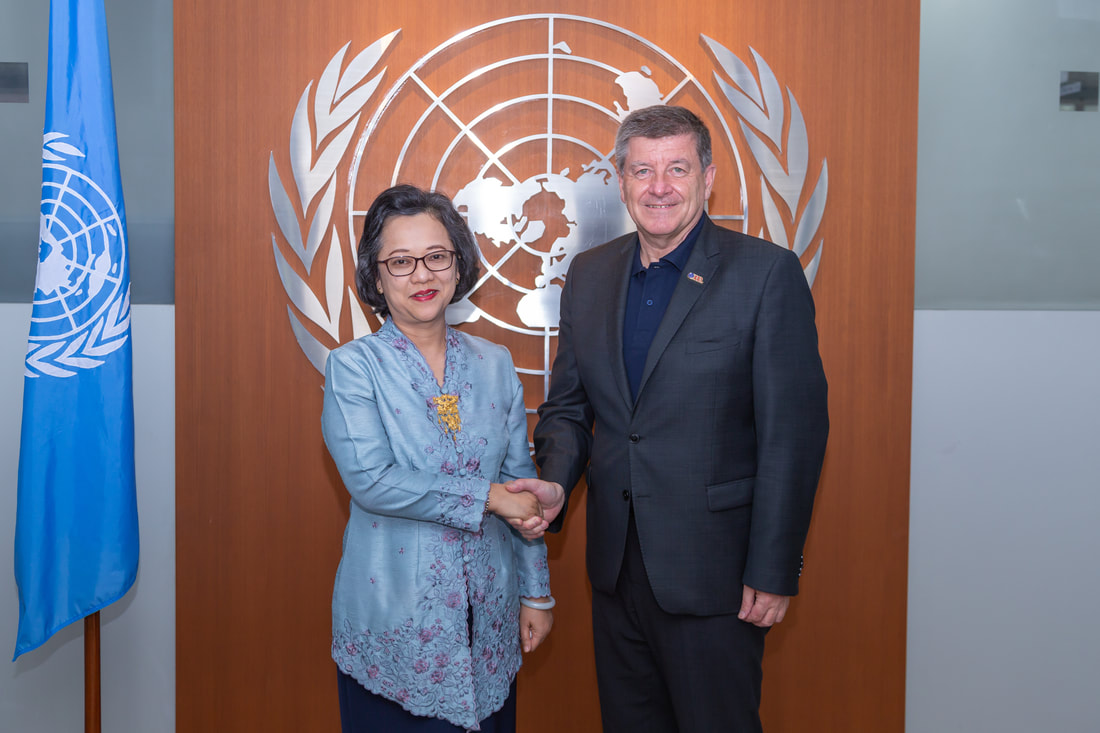
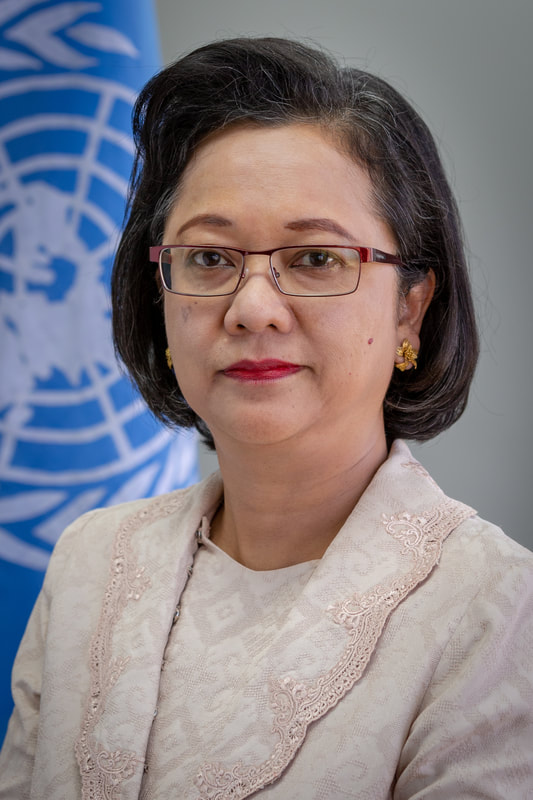
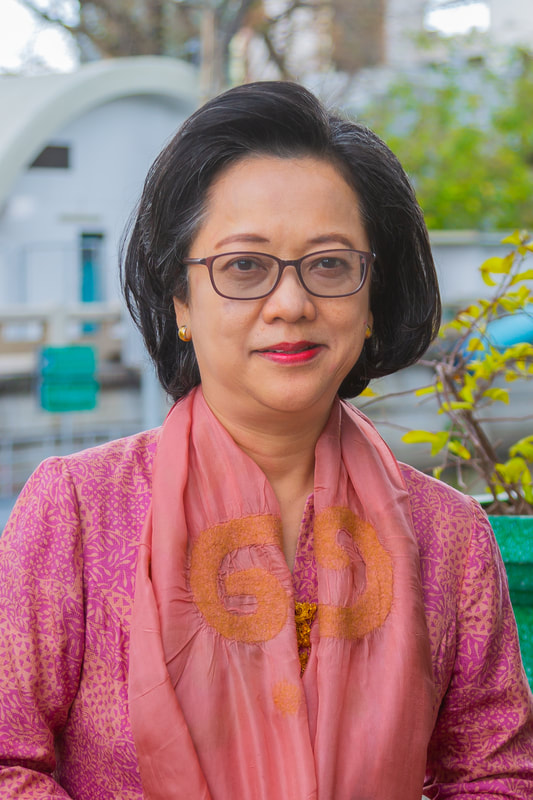
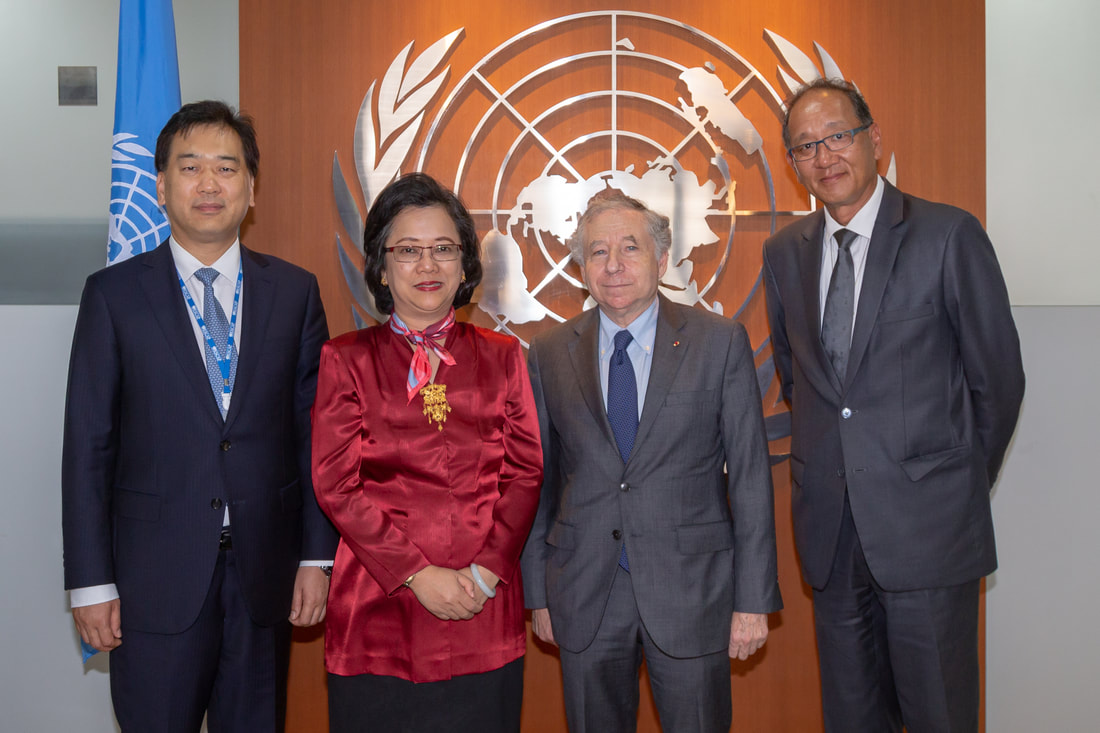
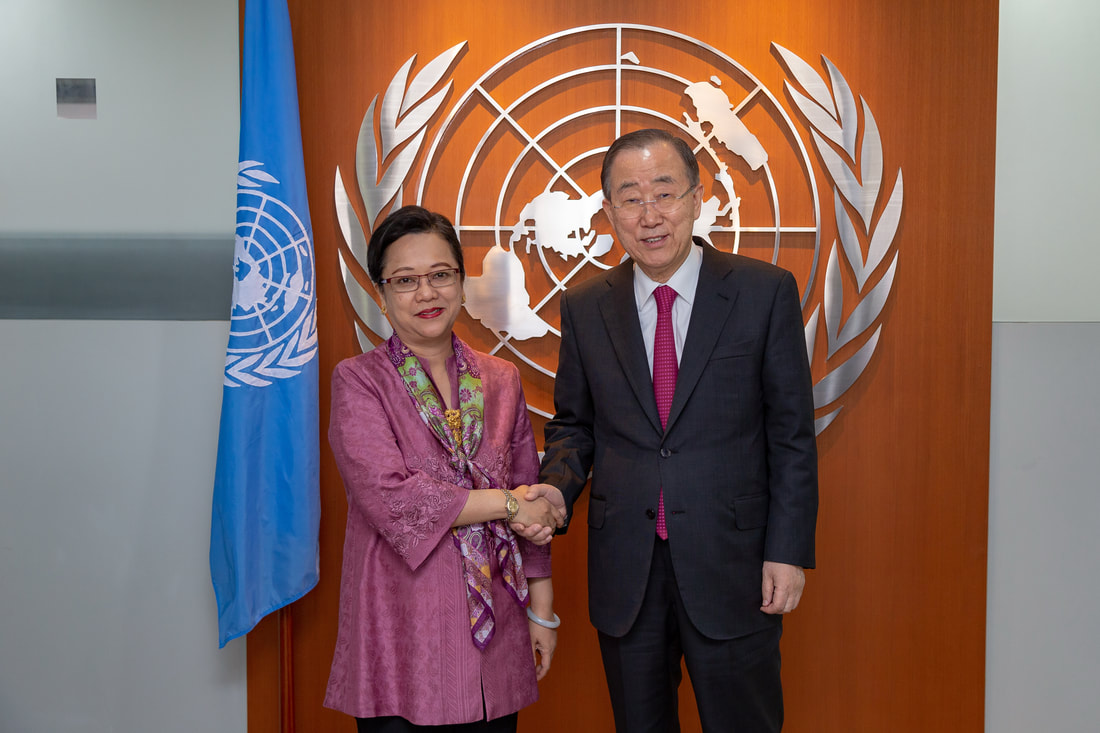
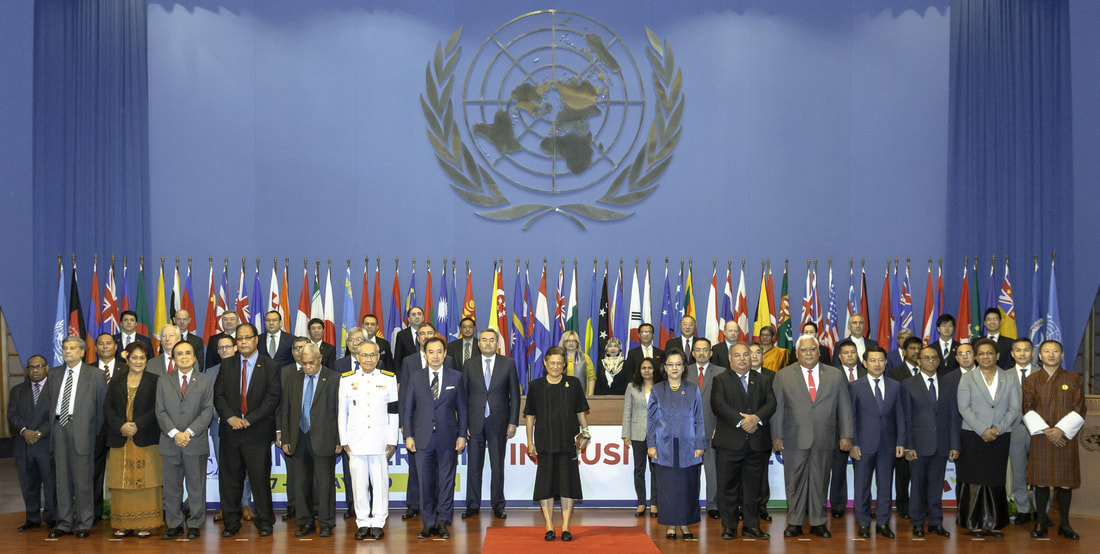
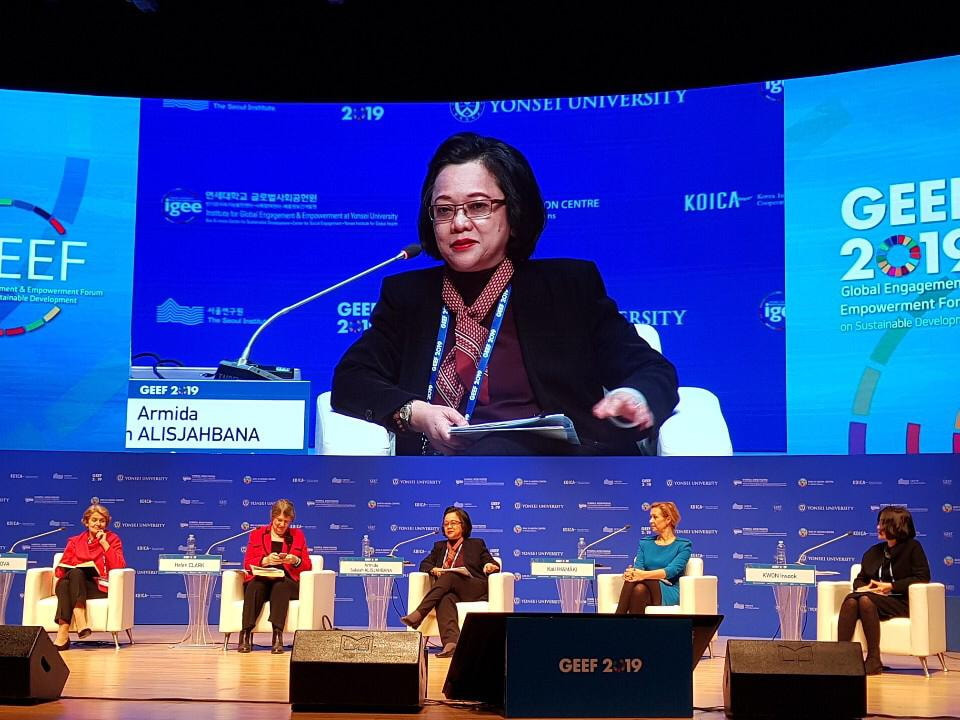
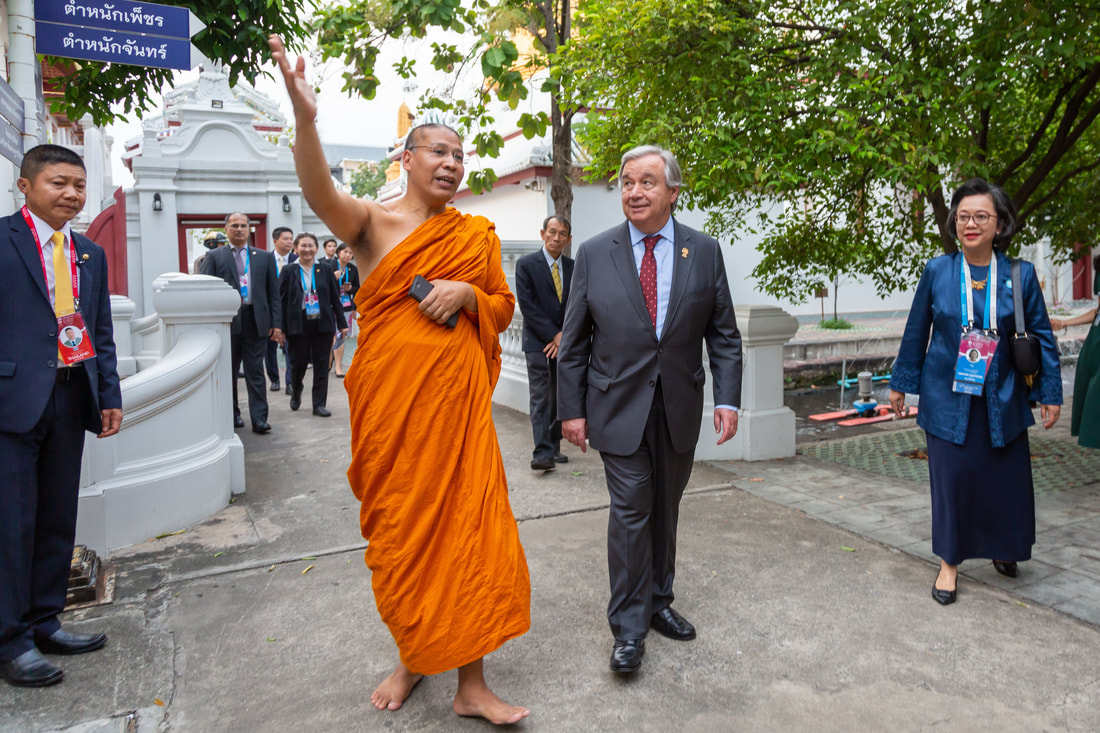
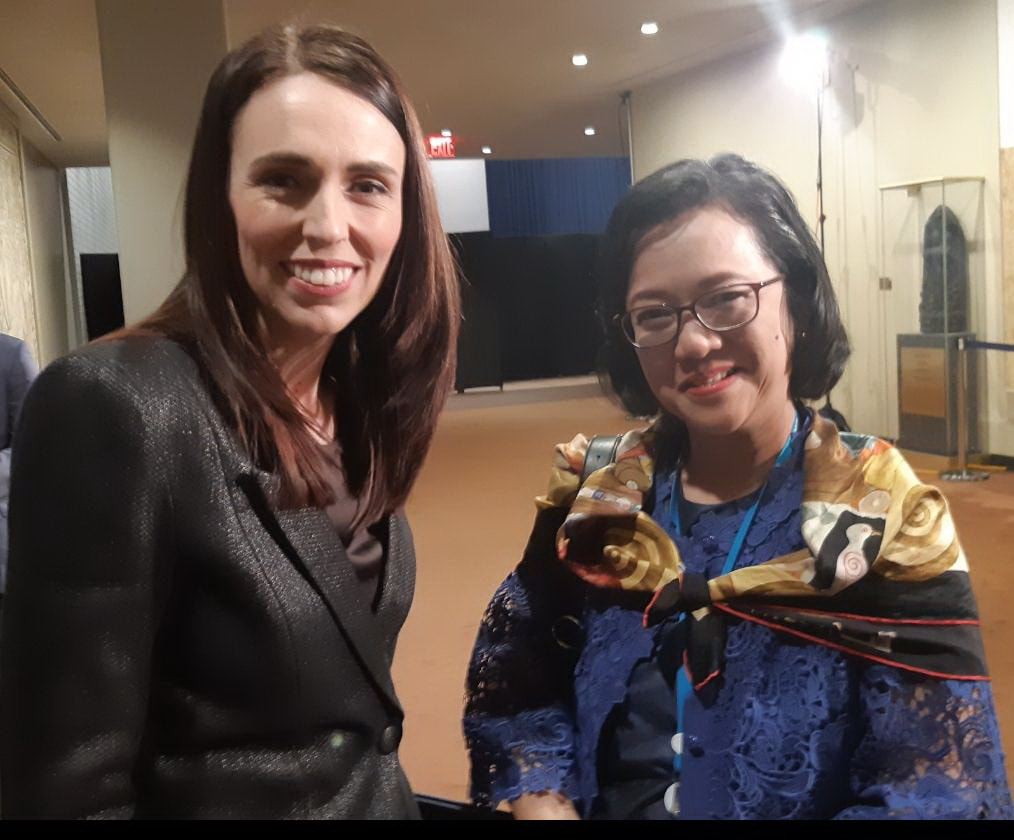
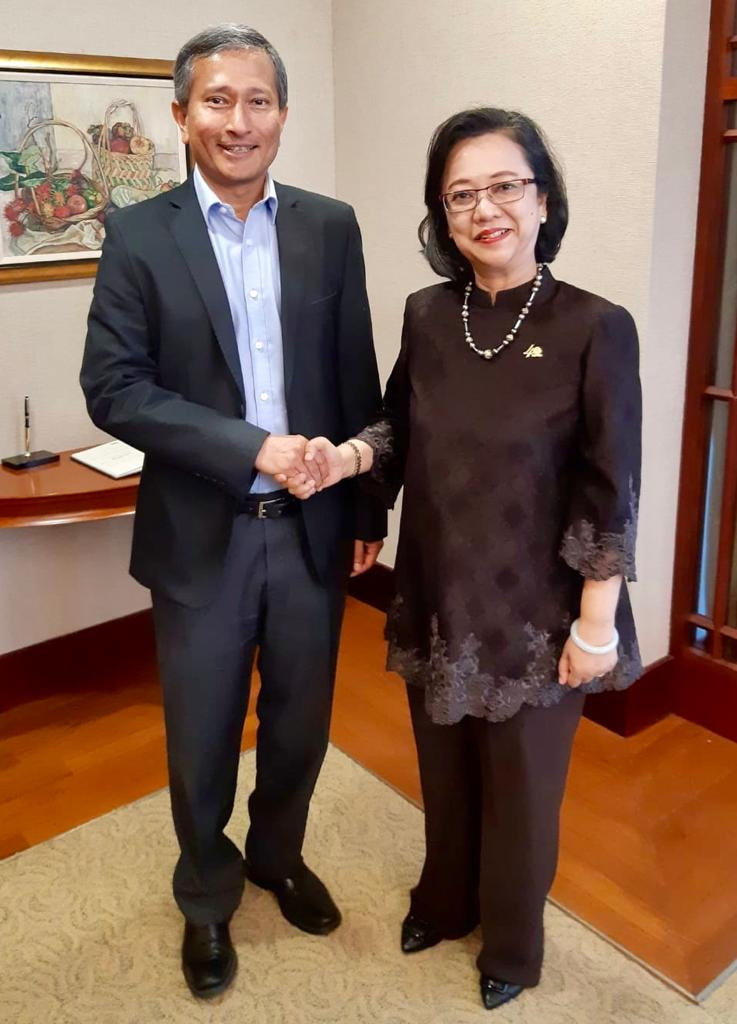
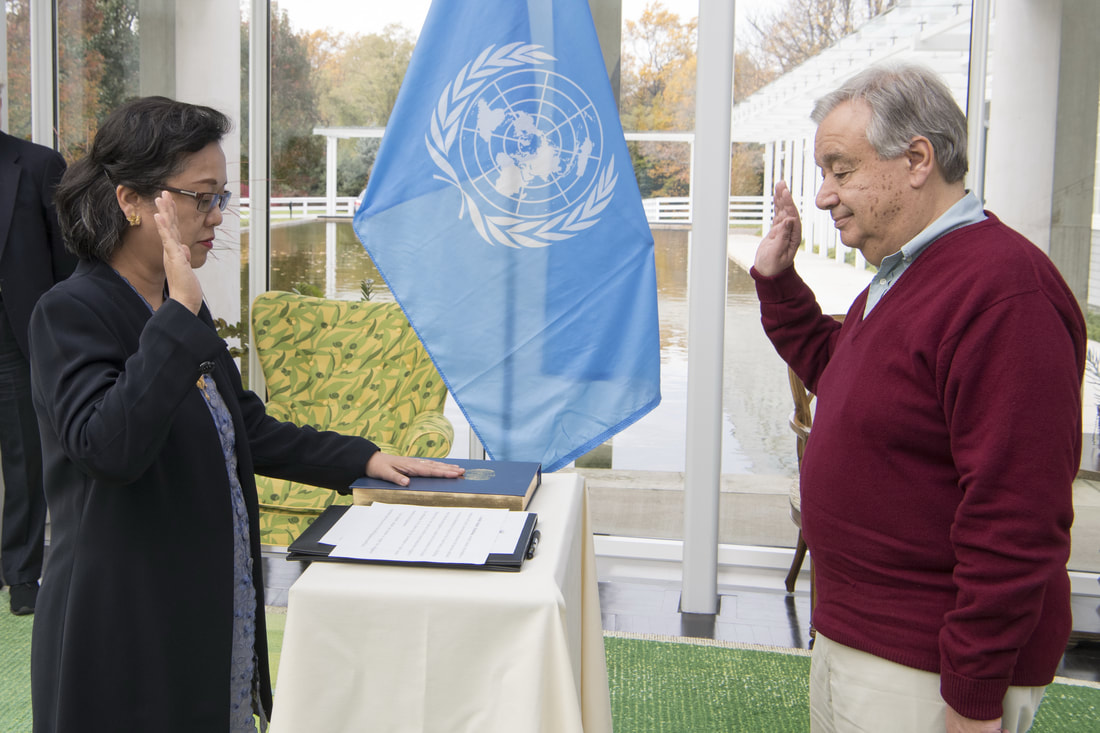
 RSS Feed
RSS Feed
















